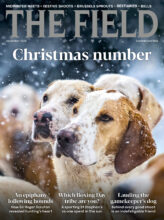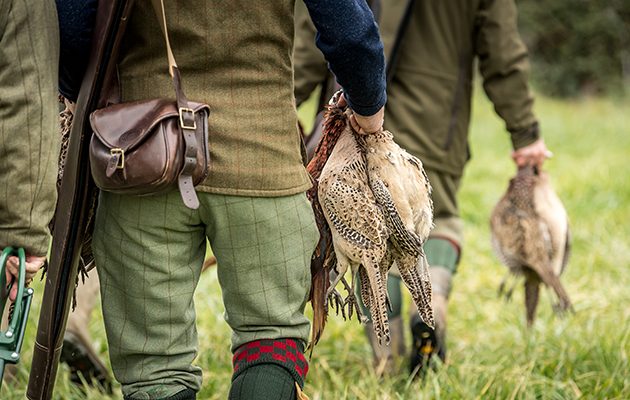No gamebirds need ever be wasted. There is always a demand for them if shoots consider alternative markets as well as the traditional, says The Country Food Trust chief executive Tim Woodward
It is our responsibility in shooting to ensure all gamebirds enter the food chain. No gamebird need ever be wasted, says Tim Woodward, chief executive of The Country Food Trust. The charity set up to provide meals for those in need using game meat, and have recently launched their Going Local Scheme.
To find out more about The Country Food Trust and to donate today, visit their website.
THE COUNTRY FOOD TRUST
In 2015, I was asked to start and run The Country Food Trust to provide meals for people in need using game meat. This is the sole aim of our charity, not to sort out the supply and demand issues surrounding shot game. However, my involvement with the charity has resulted in a steep, personal learning curve. I must confess that, prior to my new role, my knowledge of what happened to shot game, other than the brace I departed with, was limited. I was forced to go on a crash course to learn about the industry behind the sport, spending much time with people who have been dealing with the issues all their lives and who were generous with their time. It became clear that many shoot owners knew little more than I did about the destination of their game, and seemed to rely largely on their keepers to ensure it was dealt with correctly.
This has started to change but it needs to continue to do so; everyone must be involved in ensuring all our shot game is ethically dealt with. I believe, where at all possible, that all birds that are shot should enter the human food chain. I accept that parts of the processed bird may not be suitable for human consumption and that some of it may end up going to feed pets. However, I do not accept, for example, that a shoot should be sending entire birds directly to the pet food industry.

Birds ready for the game dealer.
We all have our own ethical lines but we need to focus on encouraging a continuing increase in demand in order to meet the growth in supply being created by the success of our sport. Those who shoot are the electorate in this matter and have the financial power to vote with their wallets, ensuring that shot game is dealt with correctlyby the shoots they attend. In addition to the guns, the game dealers and the professional shoots play a vital role in ensuring that shot game is used correctly.
Traditionally, game dealers collected the game for the processors to process. However, many processors also collect so we have got used to referring to them both as game dealers. Game dealers are often maligned but they are a vital part of the solution and not the problem when it comes to increasing demand. We need to remember they are businesses aiming to make a profit; if they cannot make money they may cease to trade. With game dealer numbers decreasing in recent years they now see only a minority percentage of the dead game, with many dealers now moving towards venison, which is easier to process. But the gamebird business model is changing, too.

Ready game meals from The Country Food Trust.
A few years ago I was invited to a meeting in Shropshire where the discussion centred around the local and sizeable game dealer, WilloGame. The company was in financial difficulty and the shoots it worked with were suddenly facing a significant problem: what to do with their game in the season ahead if Willo disappeared. Thankfully, a novel co-operative financing deal was proposed and today the local shoots own the dealer and ensure that the birds are collected from all shareholders, whatever their size. This is a model that could be expanded on across other areas of the UK.
Several game dealers are now registered with the British Retail Consortium (BRC), which enables them to deal directly with the supermarkets or multiples. Some, like Lincolnshire Game, have become sales orientated and introduced lead detecting, which has allowed them to make significant strides in domestic sales to the multiples, as well as to create new and expand existing foreign markets. They are also creating, at the behest of the multiples, more value-enhancing products, such as three-bird roasts at Christmas, for example. The top game dealers also use the whole of the bird, not just the breast. The legs are processed to make pâté and the carcass is sent for stock making or further manufacturing within the pet food business.
LARGE SHOOTS
Large, professional shoots are often criticised for increases in the numbers of birds released. However, they have good reason to ensure that every bird is used as they have the most to lose – not just their sport but their livelihoods, too. The largest shoots have made significant direct deals with the Continent and whilst this may have disturbed the UK dealer market and dampened some demand for game from smaller shoots, it does mean that they are dealing with their side of the sport. They can also be among the most inventive and supportive of new initiatives to increase demand. Many shoots have created new products using game meat for their clients to take away at the end of the day, from sausages to burgers and pâtés – all of which may introduce the gun to less traditional ways of consuming his or her quarry and create further demand.

Larger shoots with storage are more appealing as they can fill a dealer’s van.
Two issues have become clear to me relating to the professional side of the sport and the use of dead game. The first is that within the sport there is a percentage of birds that are not fit for the human food chain due to damage or size and these need to be disposed of correctly, as do birds that have been breasted. Some large shoots ensure the safe disposal of these birds by using incinerators on site, whilst others, like the game dealers, ship any unusable birds or remains to the renderers. Renderers then create bone meal for fertiliser and bio oils, thus ensuring that even the parts of the bird not fit for human or pet consumption are used.
The second issue is that the large shoots are more attractive to game dealers who continue with the traditional model – even more so if venison and other year-round game is available as part of the deal. The larger shoots have chillers and can fill a dealer’s van more efficiently, rather than them having to collect from numerous smaller shoots, some with and some without chillers. At the other end of the scale, the small farm shoot deals with its birds through guns, beaters and local consumers. It has become clear, however, that the middle-sized shoot without a chiller is highly vulnerable when faced with a decrease in demand and therefore needs to work hard with guns and syndicates to ensure that all its birds are used.

The Country Food Trust meals ready for distribution.
Today, it is acceptable to ask a butcher or restaurant about the provenance of the meat being offered. In the same way, guns are starting to show an interest in how the shoots they attend make use of their game. Shoots are increasingly expected to be able to answer this question, which is a good sign of progress. Some enlightened shoot owners are happy to discuss the end use of their birds.
Guns are often now able to take away more than the traditional brace. If all guns took more than a brace every time they shot this would significantly increase the demand side of the equation at source. Many guns who want to help directly are working alongside keepers and shoot owners to distribute game to neighbours, pubs and catering companies and this is having a dramatic and positive impact. Ironically, the charge some dealers have recently imposed to collect birds has proved counter-intuitive – shoots suddenly become noticeably more inventive when a charge is mentioned.

Many shoots now give guns oven-ready birds.
It is clear that perceptions and behaviour have been changing as the scale of the issue has been more widely understood. It has taken time to ensure that everyone who shoots is clear that the responsibility for dead game entering the food chain rests on their shoulders as much as the shoot owner. However, we need fewer idle commentators and critics and more people going out and making a difference and leading by example. Michael Cannon is creating delicious pies at Wild and Game and Robert Gooch at The Wild Meat Company is expanding the different ways game can be processed and sold. Backed by the sporting agents, Tom Adams and his team have launched the British Game Alliance, which is making significant progress in adding to the existing routes to market for British game. There are many other ventures working locally and nationally to increase demand and they should all receive our support.
GOING LOCAL
At The Country Food Trust we recently launched a Going Local Scheme. This has allowed shoots in an area to donate money to The Country Food Trust and we use that money to buy processed game meat from their local dealer and then deliver it to their local charities. This has turned into a virtuous circle with shoots supporting local charities and dealers having a guaranteed source of demand for their processed meat. We have such large demand building that many of the dealers we work with are now having to find more birds for the coming season, often from the shoots that supported us in the first place.

Birds being made ready for the trip to the game dealer.
In January this year on this scheme we bought 15 tonnes of meat from dealers allowing us to create 150,000 meals for people in need. Most importantly, those who have been given our ready meals or had game cooked for them by charities are unanimous in their appreciation of a warming and delicious meal. So, please ask your shoot host where the game is going and make sure that the answer is one that satisfies you. This is showing interest rather than interfering, and it will demonstrate the importance you attach to the way in which the birds you shoot are used. During the coming season, please take more than your brace – and encourage fellow guns do the same.
If you are pulling a trigger on live quarry then it remains your responsibility to ensure that the animal enters the food chain. If you cannot take birds then please consider donating money on those days to help The Country Food Trust feed people in need and give it to the British Game Alliance, who are working so hard to increase demand. We are making progress thanks to an immense amount of hard work but all involved with shooting need to continue to work together so that no pheasant will be wasted as our sport continues to grow.
Tim Woodward is the chief executive of The Country Food Trust.





